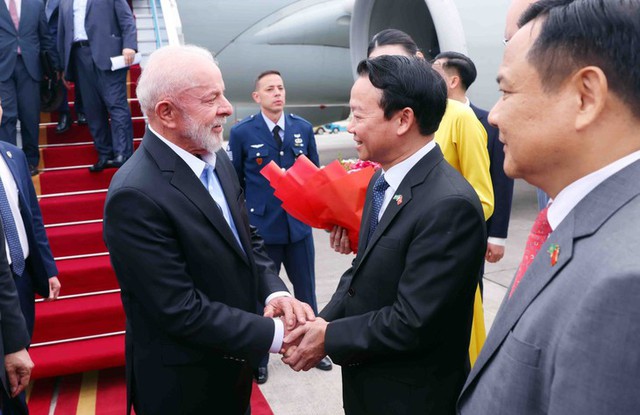Brazilian President Lula da Silva starts three-day visit to Viet Nam
VGP - Brazilian President Luiz Inacio Lula da Silva arrived in Ha Noi on Thursday afternoon, starting his three-day State visit to Viet Nam at the invitation of President Luong Cuong.

Brazilian President Luiz Inacio Lula da Silva (L) shakes hands with Minister of Agriculture and Environment Do Duc Duy, Ha Noi, March 27, 2025 - Photo: VNA
The Brazilian President and his entourage were welcomed at at Noi Bai International Airport by Minister of Agriculture and Environment Do Duc Duy, Deputy Minister of Foreign Affairs Do Hung Viet, Vice Chairman of the Ha Noi People's Committee Duong Duc Tuan, and Vietnamese Ambassador to Brazil Bui Van Nghi.
Lula is accompanied by President of the Federal Senate Davi Alcolumbre, President of the Chamber of Deputies Hugo Motta, Minister of Foreign Affairs Mauro Vieira, and other ministers in charge of transport, ports and airports, agriculture, education, energy, communications, science-technology-innovation, and environment and climate change.
The visit takes place more than four moths after the two countries elevated their ties to a Strategic Partnership during Prime Minister Pham Minh Chinh's tour to Brazil to attend the G20 Summit in Rio de Janeiro, said Vietnamese Ambassador to Brazil Bui Van Nghi.
The upgrade demonstrates the strong, substantive, and effective development of the relationship between Viet Nam and Brazil, marking a significant step forward in political and diplomatic ties between the two countries.
Meanwhile, Brazillian Ambassador to Viet Nam Marco Farani said President Lula's visit will highlight the complementary nature of the two countries and the crucial role of their economies in key sectors such as agriculture, science and technology, and innovation and open up new avenues for cooperation in trade, economy, and investment while fostering deeper people-to-people diplomacy.
Brazil is currently Viet Nam's largest trading partner in Latin America, with two-way trade nearing US$8 billion last year. The two sides aim to raise the figure to US$15 billion by 2030./.

